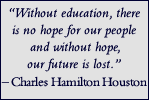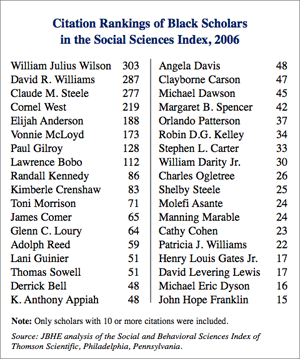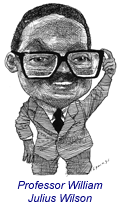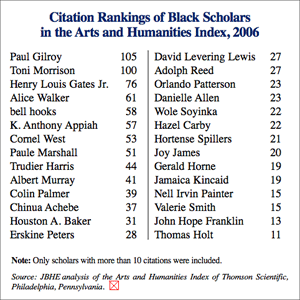|
JBHE’s Annual Citation Rankings of Black Scholars in the Social Sciences and the Humanities For the thirteenth consecutive year, JBHE publishes its citation rankings of black scholars in the social sciences. Once again, as has been the case in each of our previous surveys, the black scholar with the highest citation count in social science journals is Harvard’s University Professor William Julius Wilson. But David R. Williams of the Harvard School of Public Health is closing the gap and this year finished just behind Professor Wilson. In the humanities rankings, Yale’s Paul Gilroy is the most cited scholar for the second time in three years.
This well-established, though controversial, computerized citation counting system proceeds on the premise that it is possible to measure the impact of a scholar, an academic department, or even an entire university by the number of times scholarly research papers are cited by academic peers. In this way, proponents of citation analysis contend, it is possible to rank the world’s physicists, chemists, or even black studies scholars by the number of citations their works generate in the research papers of their academic peers. In our current “publish or perish” academic world, the citation-analysis technique, although not as positively regarded as it was several years ago, is still used by deans and department heads as a tool to help them make decisions on academic promotions, compensation changes, and tenure votes. Professor Henry Louis Gates Jr. of Harvard recently told JBHE, “When administrators are determining raises for individual faculty, they ask, “How many citations did you get? What is your influence?” Also, academic institutions and departments commonly broadcast favorable citation rankings of their faculties in appeals for alumni gifts and foundation grants. William Julius Wilson Leads Once Again
But it now appears that Professor Wilson has a serious challenger. David R. Williams, former Harold W. Cruse Collegiate Professor of Sociology and a professor of epidemiology in the School of Public Health at the University of Michigan and now Norman Professor of Public Health at the Harvard School of Public Health, has ranked just behind Professor Wilson in each of the past two years. Dr. Wil-liams has conducted groundbreaking research on the determining factors producing racial disparities in health care. Williams had 287 citations in this year’s count, which placed him second among black scholars in the social sciences. With racial disparities in health care becoming a major social issue, the scholarly work of Professor Wil-liams may challenge Professor Wilson’s perpetual leadership in social science citation rankings in the years ahead. Claude M. Steele, a professor of psychology at Stanford University, finished third this year with 277 citations. His citations increased by 26 percent in 2006 compared to 2005. Professor Steele continues to re-ceive widespread notice for his work on so-called stereotype vulnerability confronting black students when they take standardized tests. Princeton University professor Cornel West, one of the nation’s so-called marquee scholars, is in fourth place in the current rankings, dropping one spot from a year ago. Professor West has 219 citations in 2006, just two shy of his total in 2005. Elijah Anderson, a professor of sociology at the University of Pennsylvania, holds the fifth spot in our rankings, up three positions from last year’s rankings. Professor Anderson continues to receive citations for his critically acclaimed 1999 book, Code of the Street: Decency, Violence, and the Moral of Life of the Inner City, as well as for his book, A Place on the Corner: A Study of Black Street Corner Men. An updated second edition of this work was published in 2004. The highest-ranking black woman in the social sciences citation index this year was Vonnie McLoyd, professor of development psychology at the University of Michigan. She had 173 citations in 2006, which placed her in sixth position overall. Professor McLoyd has 15 more citations in 2006 than she did in 2005. Her research focuses on the impact of economic hardship on family processes, children’s mental health, and beliefs about personal efficacy. Paul Gilroy of Yale University, who routinely is one of the most cited black scholars in academic journals in the humanities, placed seventh overall in our social science citation count. Professor Gilroy had 128 citations, down 22 from a year ago. The only other black scholar to receive 100 or more citations in the social sciences was Lawrence Bobo, the noted sociologist who a few years ago left Harvard University for Stanford University. It is widely rumored that Bobo will soon return to Harvard. Most Cited Black Scholars in the Humanities
In JBHE’s first four annual surveys of citations in the arts and humanities (1998-2001), the highly prolific and influential black scholar Henry Louis Gates Jr. of Harvard University led our rankings. In 2002 Paul Gilroy, now the Charlotte Marion Saden Professor of Sociology and African American Studies at Yale, was the leader in the citation count in the humanities. Toni Morrison, the Nobel laureate and Princeton University professor, led the rankings in 2003. In 2004 these three scholars were once again at the head of the rankings. Professor Gilroy held the top spot with 112 citations, followed closely by Professor Gates. In 2005 Professor Gates narrowly edged out Professor Gilroy with Pro-fessor Morrison not far behind. This year, for the third time in the past five years, Professor Gilroy is ranked first. He had 105 citations in humanities journals in 2006, six less than a year ago. Novelist Alice Walker had 61 citations in 2006, placing her in fourth position in our survey. Poet bell hooks had 58 citations in humanities journals in 2006. This puts her in fifth place in our survey, the same spot she held last year. Princeton University philosopher K. Anthony Appiah was just behind hooks with 57 citations. Also, among the top most highly cited black scholars in the humanities are Princeton’s Cornel West; Paule Marshall of New York University; literary critic and novelist Albert Murray; Colin Palmer, Dodge Professor of History at Princeton University; Trudier Harris, J. Carlyle Sitterson Professor of English at the University of North Carolina at Chapel Hill; author Chinua Achebe, who teaches at Bard College; and Houston A. Baker, who left Duke University a year ago for Vanderbilt University. |
|




 Each year Thomson Scientific (formerly the Institute for Scientific Information) in Philadelphia enters information on more than 30 million citations from more than 1.3 million published papers in a wide variety of academic fields. Citations from 8,500 academic journals are routinely read, counted, and analyzed. JBHE, in turn, searches this database to determine how many times the works of a particular black scholar have been cited in any given year.
Each year Thomson Scientific (formerly the Institute for Scientific Information) in Philadelphia enters information on more than 30 million citations from more than 1.3 million published papers in a wide variety of academic fields. Citations from 8,500 academic journals are routinely read, counted, and analyzed. JBHE, in turn, searches this database to determine how many times the works of a particular black scholar have been cited in any given year. As we have done since 1993, JBHE recently conducted a database search of Thomson Scientific’s Social and Behavioral Sciences Index for the citation counts of dozens of black scholars in this discipline. In each of the past 12 surveys JBHE conducted on black scholars in the social sciences, we determined that the leader in rankings was Professor William Julius Wilson, the sociologist formerly at the University of Chicago who now is University Professor at Harvard University. The results this year are unchanged. Once more, the citation count leader is Professor Wilson with a total of 303 citations in academic journals. Professor Wilson’s citation count decreased by three from the previous year’s count.
As we have done since 1993, JBHE recently conducted a database search of Thomson Scientific’s Social and Behavioral Sciences Index for the citation counts of dozens of black scholars in this discipline. In each of the past 12 surveys JBHE conducted on black scholars in the social sciences, we determined that the leader in rankings was Professor William Julius Wilson, the sociologist formerly at the University of Chicago who now is University Professor at Harvard University. The results this year are unchanged. Once more, the citation count leader is Professor Wilson with a total of 303 citations in academic journals. Professor Wilson’s citation count decreased by three from the previous year’s count. But what about black scholars in the arts and humanities? Academic journals play a less important role in the humanities in comparison to the natural sciences or even the social sciences. There are not a large number of journals in which humanities issues are routinely debated. Therefore, the number of citations given to a particular scholar in the humanities — even some of the most highly respected novelists, poets, and playwrights — are likely to be far below the number of citations assigned to a scientist who publishes just one important paper in a scientific journal.
But what about black scholars in the arts and humanities? Academic journals play a less important role in the humanities in comparison to the natural sciences or even the social sciences. There are not a large number of journals in which humanities issues are routinely debated. Therefore, the number of citations given to a particular scholar in the humanities — even some of the most highly respected novelists, poets, and playwrights — are likely to be far below the number of citations assigned to a scientist who publishes just one important paper in a scientific journal.